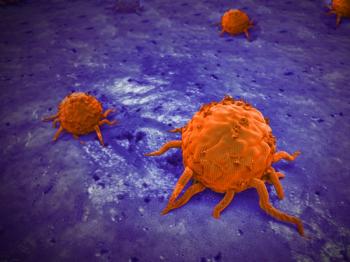
After up to 4.8 years of treatment with nusinersen, 100% of children with spinal muscular atrophy (SMA) who were treated pre-symptomatically are still alive.

After up to 4.8 years of treatment with nusinersen, 100% of children with spinal muscular atrophy (SMA) who were treated pre-symptomatically are still alive.

A study presented at the Society of Gynecologic Oncology 2020 Annual Meeting on Women’s Cancer showed menstrual cups may provide a novel, less invasive, and more comfortable approach to the diagnosis of endometrial cancer.

Oncology drugs have especially fallen victim to chronic shortages, consequently affecting the availability of substitute agents.

The researchers identified 87 articles using the PubMed and PsycINFO databases and the 2017 American Academy of Neurology (AAN) criteria for therapeutic trials.

With new and varying options for maintenance therapy in patients with ovarian cancer, patients may express a preference when discussing potential maintenance treatments and their adverse effects.

Researchers found that replacing 30 minutes of inactivity with exercise significantly reduces the risk of cancer-related death.

Tumor- induced osteomalacia is a rare disease that is characterized by tumors causing soft and weakened bones.

The authors posited that teriflunomide could prevent an excessive immune response while still maintaining enough defense against the virus.

The intent of the study was to bring awareness to the medical and nonmedical financial hardships of cancer and how they can impact the use of preventive services, since there is little research available to evaluate this topic, according to the study authors.

The FDA has approved tazemetostat for the treatment of 2 different follicular lymphoma (FL) indications.

Guselkumab is a monoclonal antibody that selectively binds to the p19 subunit of IL-23 and inhibits its interaction with the IL-23.

Galcanezumab-gnlm (Emgality, Lilly) has received FDA-approval for the preventive treatment of migraine in adults and for the treatment of episodic cluster headache in adults.

Pembrolizumab (Keytruda, Merck) monotherapy approved for adult and pediatric patients with unresectable or metastatic tumor mutational burden-high solid tumors.

The most common adverse reactions observed in the monarchE phase 3 trial include diarrhea, neutropenia, fatigue, infections, nausea, abdominal pain, vomiting, anemia, alopecia, decreased appetite, and leukopenia.

Lurbinectedin (Zepzelca) approved based on overall response rate and duration of response in patients with metastatic small cell lung cancer with disease progression on or after platinum-based chemotherapy.

Although many hubs offer similar services, no two specialty pharmacy hubs and no two hub programs are entirely alike.

Facing MBC Together is intended to recognize the prevalence and impact of isolation on the lives of individuals with metastatic breast cancer.

Pre-conference workshops will be held on September 14, with the Annual Meeting & Expo sessions and events taking place over the next four days—September 15 through September 18.

The updated guidelines include increased recommended physical activity levels and a growing emphasis on holistic rather than nutrient-based dietary habits.

Inebilizumab-cdon is only the second approved treatment for neuromyelitis optica spectrum disorder, according to the FDA.

Pharmacists can play a role in the drug reimbursement process for oncology products, which are among the most expensive of all pharmaceuticals.

FDA officials based their approval on the review of data and evidence that demonstrated a close similarity between pegfilgrastim-apgf and its reference product.

Ripretinib is a kinase inhibitor indicated for adults with advanced GIST, approved by the FDA in May 2020.

Apalutamide in combination with ADT prolonged median OS by 14 months and decreased the risk of death by 22%. Further, median OS was significantly longer, with 73.9 months for patients receiving treatment with apalutamide in combination with ADT compared with 59.9 months for patients receiving placebo in combination with ADT.

Interventions such as exercise programs and discharge planning efforts have been promising in addressing functional impairment and improving post-discharge outcomes.

Tildrakizumab is an IL-23 inhibitor indicated for adults with moderate-to-severe plaque psoriasis and is under investigation for PsA.

According to a recent study, diet can affect the outcome of chemotherapy due to microbes in the gut that can trigger changes in a patient’s response to drugs.

In the new data cut-offs from both studies, the survival advantages for the combination with fulvestrant and combination with an aromatase inhibitor were shown, but major disadvantages were also evident, according to the IQWiG.

The COVID-19 pandemic rapidly pushed traditional face-to-face instruction within schools of pharmacy into a fully remote learning environment.

Mitapivat is an investigational, oral, small molecule allosteric activator of wild-type and a variety of mutated PKR enzymes that is not yet approved by the FDA.